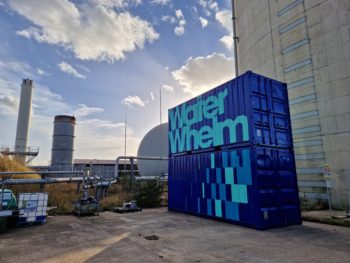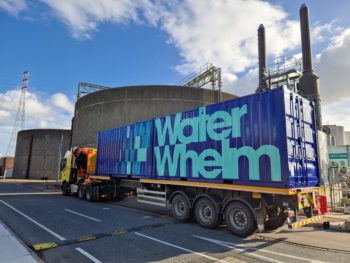An innovative technology for brackish and sea water desalination powered by low-grade waste heat
Competition: Water Discovery Challenge
Finalist Award: £49,956
Winner Award: £449,831
Led by: Waterwhelm, partnered with AtkinsRealis
Project Completion date: January 2025
Water cycle tag: Waste water treatment and recycling
Waterwhelm was announced as one of 10 winners in the Water Discovery Challenge on 20 February 2024 – read more in the announcement blog.
Project Overview
Waterwhelm has developed a breakthrough water re-use and desalination technology that operates using waste heat at wastewater treatment works (WWTWs), and other industrial sites, to produce freshwater for the sites own use. Since it uses waste heat, instead of electricity, it has a world-beating reduction in electricity consumption and CO2 emissions. The technology has been recognised by Ofwat (through its Water Discovery Challenge) as having potential to create new, low-carbon, supply-side water sources to address current and future water scarcity and demand challenges.
This project, as part of the Water Discovery Challenge winners was undertaken in Finalist and Winners Stages:
- The Finalist Stage was a feasibility and feed study to identify where a low-grade heat (<100C) version of the technology could have the most impact (i.e., in water stressed or high water demand locations). Facilitated by Discovery Mentor support to engage with water sector stakeholders; raising awareness and solidifying interest in the new technology.
- The Winner’s Stage, with Northumbrian Water (NWG) support, enabled the build and demonstration of a pilot plant at NWG’s Howdon sewage treatment works (STW). The pilot plant used simulated waste heat to produce re-use water from final effluent at the site.
During the Winner’s Stage, Waterwhelm partnered with AtkinsRéalis Water Division as consultants, who developed a prioritised list (based on water demand and cost savings) of centralised sludge treatment centres where the technology could be deployed for water re-use across WWTWs in England and Wales.
By using waste heat at WWTWs to produce water for re-use at these sites it can sustainably offset their freshwater use for benefit of environment and water customers. Further, this new way of working can deliver long-term operational resilience and more water self-sufficiency for water companies. Therefore, this project supports all four of Ofwat’s Innovation Themes. It aligns with the UK governments circular-economy, net-zero and zero-waste transitions, and the UK’s hydrogen strategy. Developing water re-use innovation supports the Environment Agency’s (EA) national framework for water resources and water abstraction reductions, and government plans accelerating new water supply sources and projects .
The drivers for this project are the climate change effects of drought/water scarcity, EA abstraction reductions (to protect ecosystems), targeted 9% reduction in non-household water consumption by 2038, and increasing population growth and demand. In 2024, the EA noted, without action now, public water supply will face a shortfall of over 4,800 MLD by 2050. Reusing wastewater, produced sustainably with waste heat, at wastewater treatment works is a viable solution to relieving their water demand from local water networks. Further, the acceleration and need for sustainable water re-use has been disseminated through water company Water Resources Management Plans (WRMP24) and business plans for AMP8. Therefore, this project was driven by the need for pre-emptive action to develop and implement an innovative, more sustainable, water supply-side option for water companies.
Industries in England and Wales currently use ~5% of water supplies, with industrial clusters currently utilising ~540MLD. Further, the UK’s 10GW hydrogen target by 2030 will need an additional 5% of public water supply. The outcome of this project has shown that low grade waste heat, readily available at WWTWs and other industrial sites, can be used to produce high quality re-use water from wastewater. This water can be used at WWTWs for their boiler feed water, polymer dilution, odour control and/or biogas water scrubbing. Another outcome of the project has been to highlight the challenges associated with bringing new innovation to large regulated WWTW site. These challenges were overcome with significant learnings gained – at all levels. With the technology proven, and with innovation implementation experience, Northumbrian Water are now leading a bid on the Water Breakthrough Challenge 5, with Waterwhelm, to scale up and fully integrate the technology at one of its WWTWs sites.
The impact of this project has been primarily to show how the new technology can sustainably produce re-use water for industrial consumption by utilising waste heat. Further, to visualise a pipeline towards commercialisation and implementation that can deliver long-term water resilience from these waste resources.



